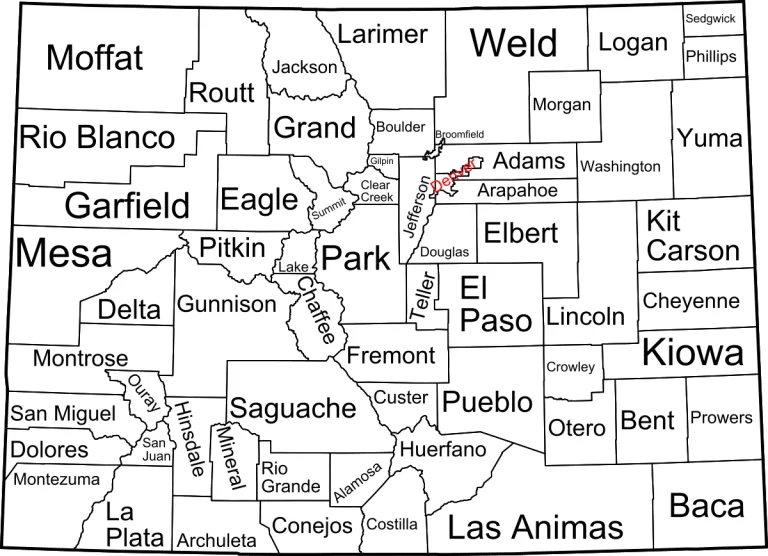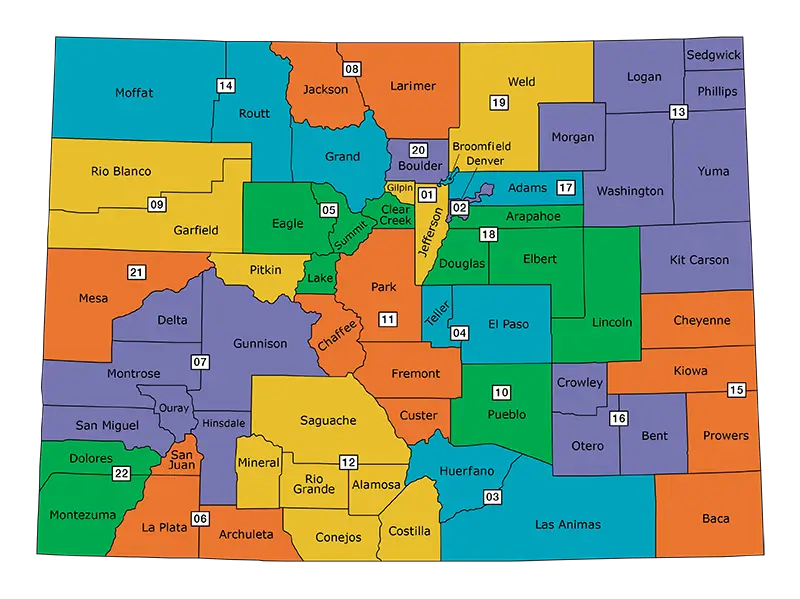Colorado

The judicial branch of government plays an integral role in maintaining law and order, interpreting laws, and protecting the rights and freedoms of citizens. In Colorado, the judiciary system is no different, holding an essential role in the state’s governance. This article delves deep into the structure, roles, and significant aspects of Colorado’s courts and judiciary system.
The Structure of the Judiciary System
The Colorado Judiciary System comprises various courts, each serving a distinct purpose and jurisdiction.
Colorado Supreme Court
As the highest court in the state, the Colorado Supreme Court oversees appeals from lower courts. It is also responsible for regulating attorneys and judges within the state.
Colorado Court of Appeals
This intermediate appellate court reviews decisions made by trial courts, except those under the direct jurisdiction of the Supreme Court.
Colorado District Courts
These are the state’s general jurisdiction trial courts, handling civil, criminal, juvenile, probate, and domestic relations cases.
Colorado County Courts
County courts handle less severe criminal and civil cases, including misdemeanor, traffic offenses, and small claims.
Colorado Water Courts
Unique to Colorado, these courts adjudicate water rights issues within the state.
Colorado Municipal Courts
These courts handle violations of municipal ordinances within city limits.
The Role of the Judiciary in Colorado
The judiciary in Colorado plays a critical role in interpreting and enforcing laws, ensuring justice is served. They maintain checks and balances on the legislative and executive branches.
The Importance of the Judiciary System
The judiciary system serves as a pillar of democracy, protecting individual rights, ensuring fairness, and maintaining social order.
The Process of Judicial Selection in Colorado
Colorado uses a distinctive process for selecting judges, focusing on merit rather than elections.
The Judicial Nominating Commission
The commission is responsible for selecting nominees for judicial positions, which are then appointed by the governor.
The Judicial Performance Evaluation
Judges’ performance is periodically reviewed and the results are made available to the public, promoting accountability and transparency.
Key Challenges and Reforms in Colorado’s Judiciary System
Like any system, the Colorado judiciary faces challenges such as case backlog and issues related to diversity and inclusion. Ongoing reforms aim to address these.
Colorado’s Judiciary: A Look Into the Future
Advancements in technology and legal practices promise a dynamic future for Colorado’s judiciary system, with opportunities for increased efficiency and accessibility.
Conclusion
Understanding Colorado’s courts and judiciary system is fundamental to appreciating the state’s commitment to justice and fairness. From the diverse court system to the meticulous process of judicial selection, the judiciary in Colorado exemplifies a balance of power, accountability, and transparency.
Frequently Asked Questions
- What is the highest court in Colorado?The Colorado Supreme Court is the highest court in the state. It has the ultimate jurisdiction over all cases in the state’s judicial system.
- How are judges selected in Colorado?Judges in Colorado are selected through a merit selection process. The Judicial Nominating Commission presents a list of nominees to the governor, who then makes the appointment.
- What types of cases do Colorado District Courts handle?Colorado District Courts are general jurisdiction courts, which means they handle a wide range of cases including civil, criminal, juvenile, probate, and domestic relations cases.
- What is the role of the Colorado Court of Appeals?The Colorado Court of Appeals is an intermediate appellate court. It reviews decisions made by trial courts, except those that fall under the direct jurisdiction of the Supreme Court.
- What is unique about Colorado’s Water Courts?Colorado’s Water Courts are unique to the state and are responsible for adjudicating water rights issues. There are seven Water Courts, one in each of the major river basins in Colorado
Municipal court
Counties in Colorado
County courts
Water courts
State court of appeals
Counties in Colorado
in
Circuit court
Here are all of the Counties located in the Colorado Estate.

County Courts
County court
Detail of every County Court is here.
Adams
Alamosa
Arapahoe
Archuleta
Baca
Bent
Boulder
Broomfield
Chaffee
Cheyenne
Clear
Colorado Specialty Courts
Conejos
Costilla
Creek
Crowley
Custer
Delta
Denver
Dolores
Douglas
Eagle
El Paso
Elbert
Fremont
Garfield
Gilpin
Grand
Gunnison
Hinsdale
Huerfano
Jackson
Jefferson
Kiowa
Kit Carson
La Plata
Lake
Larimer
Las Animas
Lincoln
Logan
Mesa
Mineral
Moffat
Montezuma
Montrose
Morgan
Otero
Ouray
Park
Phillips
Pitkin
Prowers
Pueblo
Rio Blanco
Rio Grande
Routt
Saguache
San Juan
San Miguel
Sedgwick
Summit
Teller
Washington
Weld
Yuma
Water Courts
Water Courts
Water Courts
Here are all of the Water Courts located in the Colorado Estate.
South Platte
Arkansas
Rio Grande
San Juan
Gunnison
Colorado
White
All the Courts located in Colorado are here
Municipal courts
Municipal courts
Municipal courts
Arvada Municipal Court
Ault Municipal Court
Breckenridge Municipal Court
Dacono Municipal Court
Eaton Municipal Court
Erie Municipal Court
Evans Municipal Court
Firestone Municipal Court
Fort Lupton Municipal Court
Frederick Municipal Court
Frisco Municipal Court
Garden City Municipal Court
Gilcrest Municipal Court
Greeley Municipal Court
Green Mountain Falls Municipal Court
Grover Municipal Court
Hudson Municipal Court
Johnstown Municipal Court
Keenesburg Municipal Court
Kersey Municipal Court
La Salle Municipal Court
Lochbuie Municipal Court
Mead Municipal Court
Milliken Municipal Court
Nunn Municipal Court
Otis Municipal Court
Platteville Municipal Court
Severance Municipal Court
Silverthorne Municipal Court
Windsor Municipal Court
Wray Municipal Court
See Other Courts in US
Alabama | Alaska | Arizona | Arkansas | California | Colorado | Connecticut | Delaware | Florida | Georgia | Hawaii | Idaho | Illinois | Indiana | Iowa | Kansas | Kentucky | Louisiana | Maine | Maryland | Massachusetts | Michigan | Minnesota | Mississippi | Missouri | Montana | Nebraska | Nevada | New Hampshire | New Jersey | New Mexico | New York | North Carolina | North Dakota | Ohio | Oklahoma | Oregon | Pennsylvania | Rhode Island | South Carolina | South Dakota | Tennessee | Texas | Utah | Vermont | Virginia | Washington | West Virginia | Wisconsin | Wyoming
